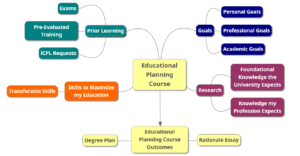Educational Planning Course Basics
What is Educational Planning?

Educational Planning is the course in which you work with your mentor/advisor to choose courses to map out your degree.
However, Educational planning always involves more than choosing courses. It also may involve:
- considering the knowledge and skills that might be expected of you as a professional in a certain field
- deciding whether you have gained college-level knowledge through work or any other type of experience, and deciding whether you want to pursue credit through Empire’s Prior Learning Assessment process
- planning an undergraduate degree to prepare for and lead into graduate study
- considering your own interests and what you want to learn in addition to what you need to learn for your type of degree
- anything else related to your educational journey at Empire…
All of the learning activities in an Educational Planning course lead toward developing two end products, a degree plan and rationale essay.
Key Takeaway – Two Main Products of Educational Planning
Educational Planning courses have two main products:

- a degree plan mapping out the rest of your courses with Empire, chosen based on your goals, SUNY Empire Knowledge Foundations for your degree, and SUNY general education requirements
- a rationale essay explaining how your course choices both support your goals and fulfill the required knowledge foundations in your area of study, for your type of degree
Who takes an Educational Planning Course?
You may take an educational planning course if you are designing an individualized degree, one listed on the page on Individualized Degree Design.

Individualized degrees have some flexibility in that you have choice in how to fulfill the knowledge foundations for your degree.
An Educational Planning course provides a structured way of working with your mentor/advisor to make sure that your individualized course choices logically fulfill those knowledge foundations.
Why Educational Planning?

You may have come to SUNY Empire with bits and pieces of degrees and prior learning – pieces that have to fit together coherently within the context of the required foundational knowledge for your area of study. Educational Planning courses are designed to help you put these pieces together.
Note that the process of developing your degree is as important as the final products. The philosophy behind Educational Planning is informed decision-making. In addition to exploring the knowledge needed both to fulfill academic requirements, you will explore what you have already accomplished toward your degree, what you need to accomplish, where you want to go, and what it takes to get there. You’ll learn that when there’s opportunity for choice, you have a voice in what you want to study and why.
Educational Planning helps enhance informed decision-making skills that are transferable to and important in many life situations.
Content of Educational Planning Courses
You enroll in and get credit for an educational planning course because course choice and degree design are not necessarily simple processes. They may involve researching:

- your short- and long-term goals
- what the foundational knowledge areas required for your degree actually mean, and what they might include
- the skills and knowledge currently expected of a college graduate in your professional area, or for a professional certification
- graduate programs’ prerequisites if your undergraduate degree is a step toward a graduate degree
- what’s involved in credit for prior learning and how to create individualized prior learning requests
- your own skills and abilities to succeed academically and professionally
- and more…
Educational Planning courses guide you through relevant research so that you can make informed decisions about your degree path and its contents.
Different Educational Planning Courses
There are four different educational planning courses whose outcome is a degree plan and a rationale essay that explains your choices in your degree:
- EDPL 1005 – Educational Planning, 2 cr. introductory level
- EDPL 1010 – Educational Planning, 4 cr. introductory level
- EDPL 3005 – Educational Planning, 2 cr. advanced level
- EDPL 3010 – Educational Planning, 4 cr. advanced level
Why are there different credit amounts for Educational Planning Courses?
There are different credit amounts for educational planning courses for two reasons:
- college policy
- student and mentor/advisor preference
College Policy
College policy for Individualized Program: Educational Planning states that you need two credits of educational planning for an individualized associate degree and four credits for an individualized bachelor’s degree.
Everyone doing an individualized associate or bachelor’s degree does two credits of educational planning with their mentor/advisor in one of the four courses listed above.
Student and Mentor/Advisor Preference
For the other two of the four educational planning credits required for a bachelor’s degree, students and mentors/advisors have two options:
- They can work together to do supportive investigations into professional requirements, skills, prior learning, and more in the four-credit educational planning course.
- Students can opt to do a two-credit course in an area that supports planning and succeeding with your degree. These courses can be found in the Term Guide and Catalog by choosing the attribute “educational planning.” You will find courses such as Prior Learning Assessment, 21st Century Careers, Exploring the Professions: Children and Childcare, Effective Academic Writing, Learning Styles, and more.
An Educational Planning Course is Part of a Process

In addition to the two main products of Educational Planning, your degree plan and rationale essay, there may be other outcomes based on the process you and your mentor/advisor follow, the insights you develop, and the decisions you make.
There’s no one way to plan a degree; much of the process depends on you and your mentor, and the different things you need to consider. Know, though, that educational planning actually starts informally in your first conversation with your mentor, who may ask you about your interests, goals, what type of degree you want to pursue, and more. The educational planning course simply formalizes and structures this ongoing conversation.
However you approach planning your degree, there are a few general planning strategies that may help both before and while you take an educational planning course:
You may be asked about your interests and goals, so start thinking early on about what you really want to accomplish via this degree. Learning occurs most fully when a learner invests personally in the learning process, so investigating your goals is a usual activity in an educational planning course.
Start reading the Knowledge Foundations relatively early for degrees in which you’re interested. The Program Details listed for different programs on the page Individualized Degree Design list the foundational academic knowledge and skills that are expected in degrees in certain fields.
If you are considering credit for prior learning in your degree, discuss that with your mentor and start the process relatively early, so you get a sense of how many credits you may have. [1]

Key Takeaway – Educational Planning Basics

You and your mentor/advisor will decide on which educational planning course to do, and when best to do it.
Remember that the two key products of an educational planning course are your:
- degree plan
- rationale essay
Once you have created products, they will be sent to an academic review committee to validate your degree choices and content, and you will have your own roadmap of courses to take for the rest of your degree.
- Mind map created with free mindmup software ↵
